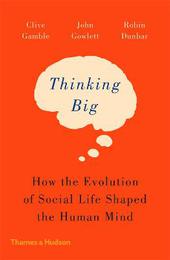
|
Thinking Big: How the Evolution of Social Life Shaped the Human Mind
Paperback / softback
Main Details
| Title |
Thinking Big: How the Evolution of Social Life Shaped the Human Mind
|
| Authors and Contributors |
By (author) Clive Gamble
|
|
By (author) John Gowlett
|
|
By (author) Robin Dunbar
|
| Physical Properties |
| Format:Paperback / softback | | Pages:240 | | Dimensions(mm): Height 198,Width 130 |
|
| Category/Genre | Archaeology |
|---|
| ISBN/Barcode |
9780500293829
|
| Classifications | Dewey:155.7 |
|---|
| Audience | |
|---|
| Illustrations |
With 57 illustrations
|
|
Publishing Details |
| Publisher |
Thames & Hudson Ltd
|
| Imprint |
Thames & Hudson Ltd
|
| Publication Date |
18 January 2018 |
| Publication Country |
United Kingdom
|
Description
When and how did the brains of our hominin ancestors become human minds? When and why did our capacity for language or art, music and dance evolve? It is the contention of this pathbreaking and provocative book that it was the need for early humans to live in ever-larger social groups, and to maintain social relations over ever-greater distances - the ability to 'think big' - that drove the enlargement of the human brain and the development of the human mind. This 'social brain hypothesis', put forward by evolutionary psychologists such as Robin Dunbar, one of the authors of this book, can be tested against archaeological and fossil evidence, as archaeologists Clive Gamble and John Gowlett show in the second part of Thinking Big. Along the way, the three authors touch on subjects as diverse and diverting as the switch from finger-tip grooming to vocal grooming or the crucial importance of making fire for the lengthening of the social day. As this remarkable book shows, it seems we still inhabit social worlds that originated deep in our evolutionary past - by the fireside, in the hunt and on the grasslands of Africa.
Author Biography
Clive Gamble is a British archaeologist and anthropologist, and Professor of Archaeology at Southampton University. He has been described as the 'UK's foremost archaeologist investigating our earliest ancestors'. John Gowlett is Professor of Archaeology, Classics and Egyptology at Liverpool University. He is involved in fieldwork in eastern and southern Africa. Robin Dunbar is a British anthropologist and evolutionary psychologist specialised in primate behaviour. He is currently head of the Social and Evolutionary Neuroscience Research Group in the Department of Experimental Psychology at the University of Oxford. He is best known for formulating Dunbar's number, a measurement of the 'cognitive limit to the number of individuals with whom any one person can maintain stable relationships'.
Reviews'An important, provocative essay on human evolution, argued with great eloquence and skill' - Current Archaeology 'A triumph of collaboration, as well as a gripping detective story' - New Statesman 'A dramatic demolition of the "stones and bones" approach to archaeology' - New Scientist 'Retains the Thames & Hudson tradition of thinking clearly, and writing well ... You will not read a more important book this year' - Minerva 'An important piece of work ... anyone with an interest in early human and pre-human society should add to their reading list' - Popular Science Books blog 'Compelling' - The Lady '`An important piece of work ... anyone with an interest in early human and pre-human society should add to their reading list' - Popular Science Books blog
|